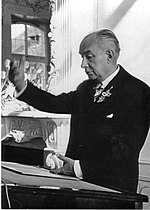Alexander Rüstow
| Alexander Rüstow | |
|---|---|
 |
|
| Born |
8 April 1885 Wiesbaden |
| Died | 30 June 1963 (aged 78) Heidelberg |
| Nationality | Germany |
| Field | Macroeconomics |
| School or tradition |
Ordoliberalism |
| Influenced | Ludwig Erhard |
| Contributions | Social market economy |
Alexander Rüstow (April 8, 1885 – June 30, 1963) was a German sociologist and economist. In 1938 he originated the term neoliberalism at the Colloque Walter Lippmann. He was one of the fathers of the "Social Market Economy" that shaped the economy of West Germany after World War II. He is the grandnephew of Wilhelm Rüstow, the grandson of Cäsar Rüstow and the father of Dankwart Rustow.
Rüstow was born in Wiesbaden in the Prussian Province of Hesse-Nassau. From 1903 till 1908, he studied mathematics, physics, philosophy, philology, law and economics, at the universities of Göttingen, Munich and Berlin. In 1908, he obtained his doctorate under Paul Hensel, at the University of Erlangen, on a mathematical topic, Russell's paradox. He then worked at the Teubner publishing house in Berlin, until 1911, when he started working on his habilitation, on the knowledge theory of Parmenides. He had to interrupt his work though at the outbreak of the First World War, when he volunteered for the German Army.
After the war, Rüstow, then still a socialist, participated in the November Revolution, and obtained a post at the Ministry of Economic Affairs, working on the nationalization process of the coal industry in the Ruhr Area. Disillusioned with socialist planning, he started working for the VdMA, the German Engineering Federation in 1924. The engineering companies in Germany suffered much by the protected and subsidized coal and mine industry.
...
Wikipedia
